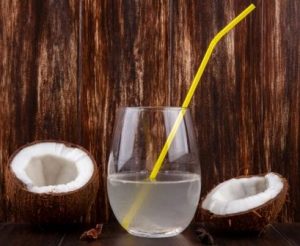The coconut water found inside immature coconuts is a clear liquid. Water in the coconut is replaced with coconut meat as it matures. Immature coconuts are green in colour, which is why coconut water is sometimes called green coconut water.
Coconut water differs from coconut milk. Grated meat from mature coconuts is emulsified to produce coconut milk.
We use coconut water commonly used for treating diarrhea or dehydration due to physical activity and a beverage. In addition, it is used to improve exercise performance and lower blood pressure.
Coconut Water | What does it do?

Coconut water, which contains electrolytes, is highly sought after as a treatment for and prevention of dehydration due to its electrolyte composition. Coconut water is abundant in carbohydrates and electrolytes like sodium, potassium, and magnesium. However, some experts claim that coconut water’s electrolyte composition doesn’t make it suitable for rehydrating.
Even though it isn’t a miracle cure, it has numerous health benefits.
7 Health Benefits of Coconut Water
An all-natural sports drink
With natural electrolytes, coconut water can compete well with traditional sports drinks such as Gatorade. People reach for coconut water for its natural sweetness, absence of sugar, and lack of colouring or artificial sweeteners.
Coconut water is an excellent replacement for fluids and helps you stay hydrated after a run. Compared to most drinks marketed for endurance performance, it has fewer carbohydrates. It does, however, contain less sodium than most sports drinks, a mineral necessary to replace sodium lost through sweat. If you exercise long enough (more than 90 minutes), you may not get enough energy from it, but when you at the end of the exercise, it can rehydrate you.
The study found that coconut water was not better at rehydrating than water or a traditional sports drink after exercising. Despite feeling nauseous, it was easier to consume enough fluids without feeling upset. We should also avoid coconut water with added sugars since they increase calorie intake and prevent proper hydration.
Low in calories
Researchers determined that coconut water contains 45 calories per cup, making it a healthy alternative to sodas and juices, which are higher in sugar and calories. Compared to most juices, coconut water has fewer carbohydrates and sugar. Furthermore, it contains more sodium, potassium, minerals, and electrolytes even though casual sipping is not as healthy as zero-calorie water.
Potassium
Most sports drinks contain ten times less potassium than coconut water in terms of potassium, and it has the same value as a banana. The average Indian does not consume the recommended amount of potassium each day. Potassium in coconut water is 405 milligrams per cup, so it may help prevent cramps.
In the body, potassium maintains fluid balance, especially during exercise. A high sodium intake can have a negative effect on blood pressure, but coconut water has a lot of potassium, so the potassium may help counteract this.
Rich in Magnesium and calcium
The mineral calcium helps in building strong bones and teeth and in many bodily processes. A healthy muscle contracture is essential. Exercise breaks down your bones as your muscles pull on them. As part of the healing process, calcium is used by your bones to get stronger and to repair themselves.
For muscles to contract and relax, magnesium helps move calcium and potassium into them. Additionally, it supports the function of the organs and helps with energy production. After an intense workout, you may feel cramps, restless muscles, or spasms that deplete your magnesium levels.
The mineral content of coconut water is higher than that of other sports drinks or fruit juices, but the minerals are not concentrated. Only five percent of calcium and magnesium are found in coconut water.
Antioxidants
Exercising can damage our bodies, which is why coconut water contains antioxidants that can neutralize free radicals and oxidative stress. Another benefit is that it hydrates the body. You can get the most antioxidants from fresh coconut water. Recent research indicates that heat pasteurized and processed coconut water has fewer antioxidants.
Amino acids
When tissue is repaired, amino acids are needed to construct proteins. The alanine, arginine, cysteine, and serine content in coconut water is higher than in cow’s milk. You can get arginine from it, an amino acid that helps your body deal with stress (such as the stress caused by an intense workout). As well as promoting heart health, arginine may also reduce blood pressure.
Cytokinins
Coconut water also contains the growth hormones cytokinins, which help plants grow. They are thought to have anti-aging and anti-cancer properties. The benefits of coconut water for cancer prevention have not been thoroughly studied to date.
What you need to know
After a hard workout and a lot of sweat, coconut water will help you rehydrate. Instead of artificial additives and sugars, try coconut water instead of a traditional sports drink.
If you prefer coconut water, you might want to consider its calories when trying to lose weight. Scientists recommend drinking water rather than coconut water in cases where you don’t sweat too much since coconut water doesn’t hydrate as well as water and is filled with a lot of calories and sugars.
The healthiest coconut water is fresh and unprocessed so that you can reap its full antioxidant benefits.



very informational rich blog , coconut is a wonderful Online nutritionist food given by nature. It is a magical food which cannot be altered. which acts as a best electrolyte and retain salts in the body which lost in the form of dehydration.
It’s been eons since I’ve been drinking coconut water; for me it has done wonders! I am so grateful for the availability…since I can’t live in the jungle,ha! I live in a different jungle…..
What may I ask, which jungle?
I live in the Philippines and have access to coconut every day. I use it in Ensure twice a day and when I come from working in my garden my clothes is totally saturated with sweat. I love it make a mean Mango smoothie with the water and the young coconut.
Excellent information doc God bless you abundantly for the research.
Is processed coconut water healthy
If not. Why
Most of the brands add preservatives that are bad for health, and processed coconut water has fewer antioxidants than fresh coconut water.
Hi there. I recently had coconut water from the actual coconut. It was not from a store. It was delicious.
What is the best brand of coconut water to buy? And where can I find it?
I always prefer coconut water from the actual coconut. Still, if you are looking for brands, our recommendations are Harmless Harvest Coconut Water, Goya pure coconut water & NutriVsta Pink Coconut Water.
This is a very informative post, regarding benefit of coconut water.
It’s also an ideal tonic for Acid Reflux/acid reduction.
I’ve been experimenting with it for a while and it’s really helpful…only about 1/2 cup about 2 hours before bed…
I live in the Caribbean and always drink coconut water, sometimes mixing it with other native fruits. I totally recommend it. Excellent information. Good job drugresearch.
Very informative
I love coco water
So where can I get pure coconut water to help with my high blood pressure?
According to WebMD & Healthline “Drinking coconut water might lower blood pressure in people with high blood pressure”
Source:
1. https://www.webmd.com/vitamins/ai/ingredientmono-1261/coconut-water
2. https://www.healthline.com/nutrition/7-health-benefits-of-water
Is there a limit on how much coconut water one could drink in a day?
Would it be healthy to drink that amount everyday?
As per Dr. Stephenson Advice, “do not drink more than 2 to 3 cups of coconut water per day.”
Good advice